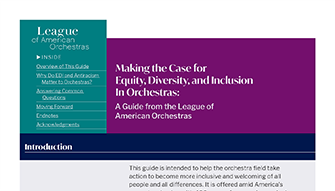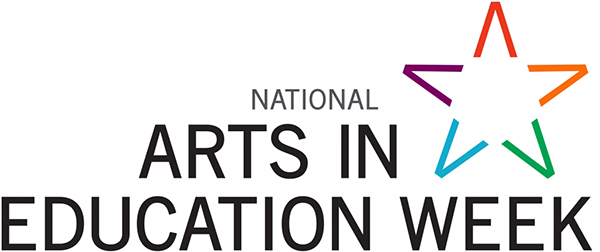New Resource Guide from the League of American Orchestras: Making the Case for Equity, Diversity, and Inclusion in Orchestras
 Developed by our colleagues at the League of American Orchestras and available at no cost to members and non-members of the League alike, Making the Case for Equity, Diversity, and Inclusion in Orchestras offers concrete answers and practical resources that orchestras can use to advance anti-racism and equity, diversity, and inclusion (EDI) at all levels of their organizations. Developed in collaboration with a team of peers—orchestra musicians, music directors, board members, and staff—this resource guide is intended to help the orchestra field take action to become more inclusive and welcoming of all people and all differences.
Developed by our colleagues at the League of American Orchestras and available at no cost to members and non-members of the League alike, Making the Case for Equity, Diversity, and Inclusion in Orchestras offers concrete answers and practical resources that orchestras can use to advance anti-racism and equity, diversity, and inclusion (EDI) at all levels of their organizations. Developed in collaboration with a team of peers—orchestra musicians, music directors, board members, and staff—this resource guide is intended to help the orchestra field take action to become more inclusive and welcoming of all people and all differences.ACSO encourages our members and network to use this incredible free resource as you are navigating key questions around equity and making your case to take action for change. Click here to access the Guide.

 Note from ACSO: The author of this article, Retired United States Marine Corps Major Brian Dix, was Director of “The Commandant’s Own,” The U.S Marine Drum & Bugle Corps, in Washington, D.C. He is currently an independent conductor and composer in San Diego, California.
Note from ACSO: The author of this article, Retired United States Marine Corps Major Brian Dix, was Director of “The Commandant’s Own,” The U.S Marine Drum & Bugle Corps, in Washington, D.C. He is currently an independent conductor and composer in San Diego, California. Note from ACSO: The author of this article, Julia Ward, is the director, development communications and strategy and editor, Past/Forward: The LA Phil at 100 at the Los Angeles Philharmonic. She is also on ACSO's Board of Directors.
Note from ACSO: The author of this article, Julia Ward, is the director, development communications and strategy and editor, Past/Forward: The LA Phil at 100 at the Los Angeles Philharmonic. She is also on ACSO's Board of Directors.
 Note from ACSO: The author of this blog, Leslie Schlussel, is ACSO's Summer 2018 Conference and Membership Intern and her internship is supported by a
Note from ACSO: The author of this blog, Leslie Schlussel, is ACSO's Summer 2018 Conference and Membership Intern and her internship is supported by a 